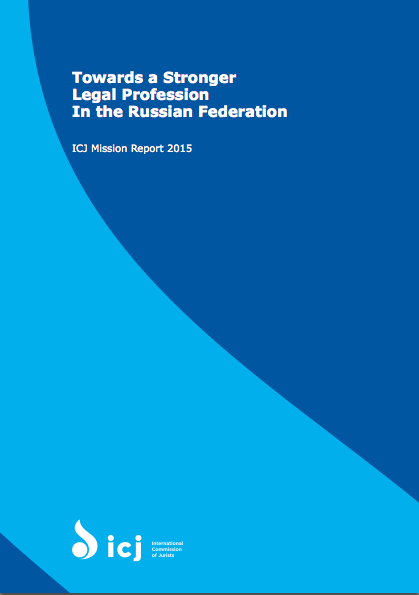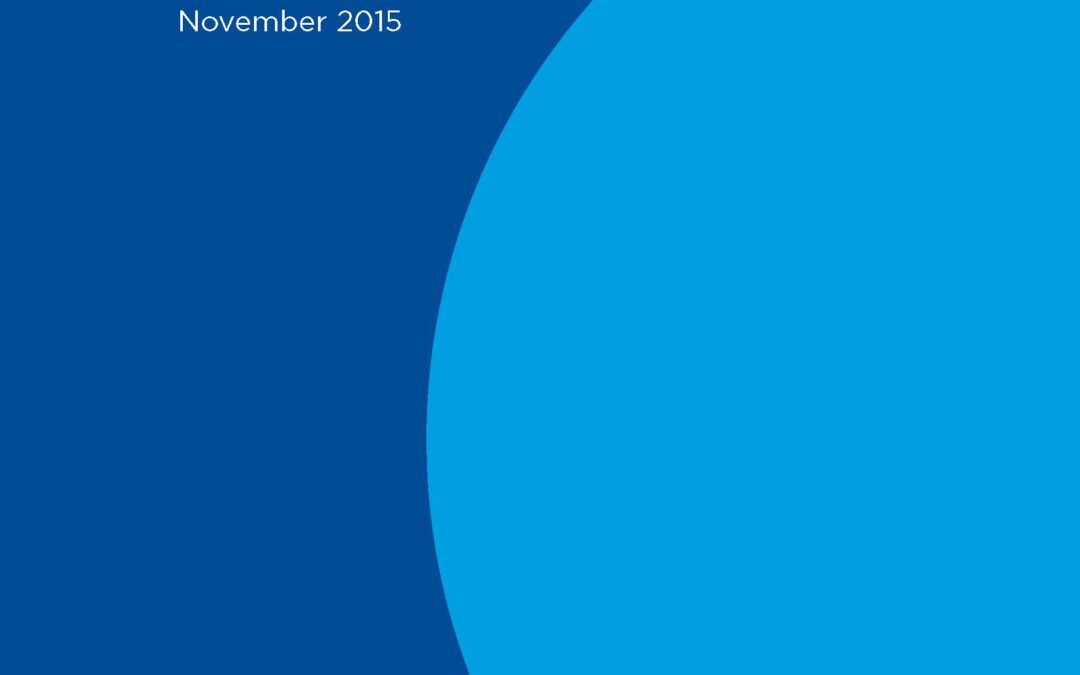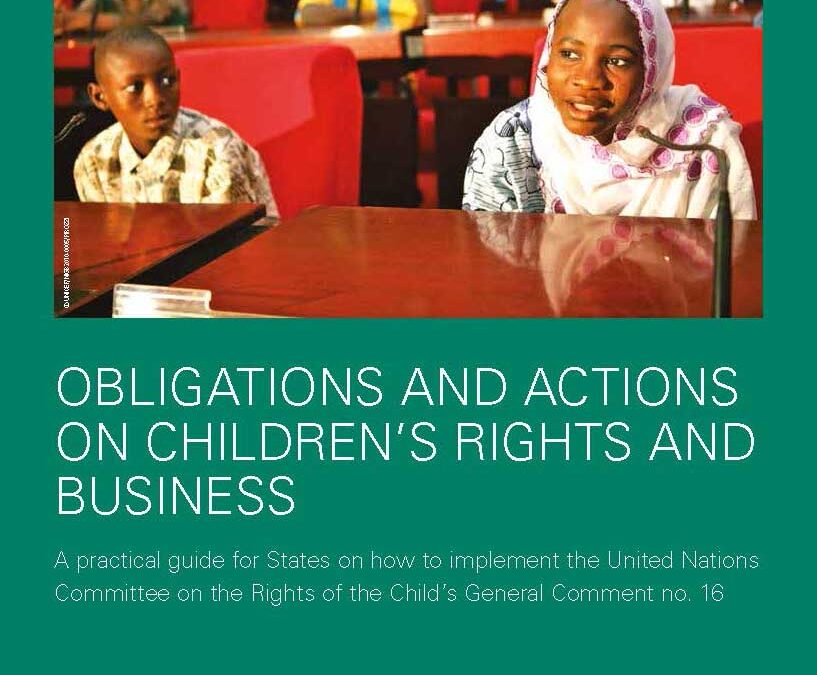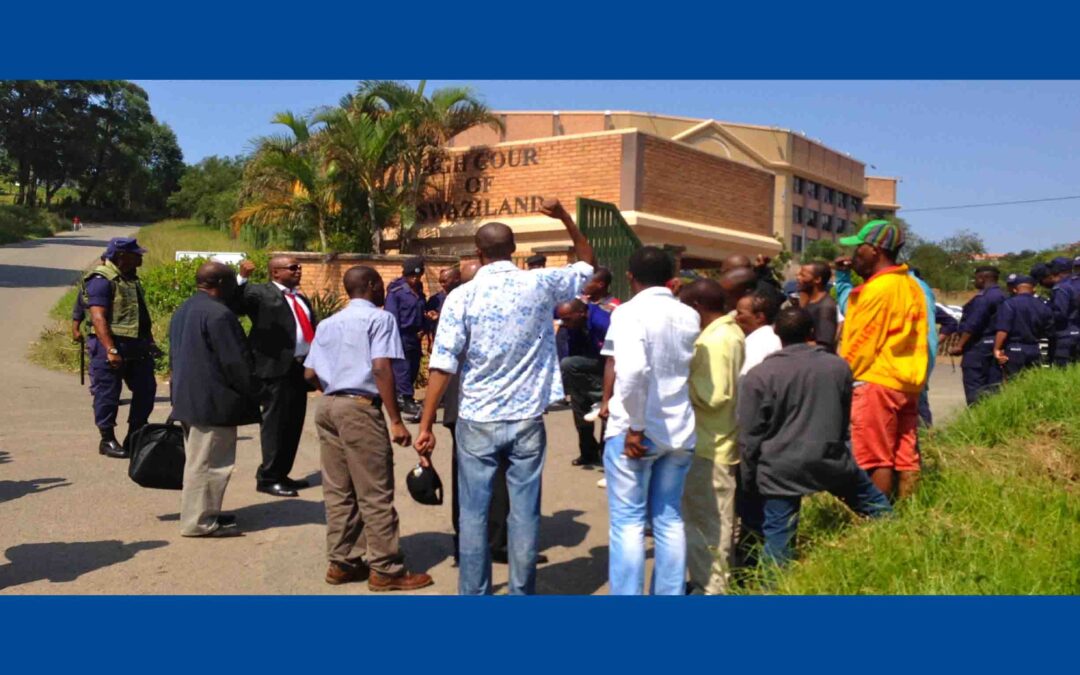
Nov 24, 2015
Today, the ICJ released a report calling for reform of the legal profession in the Russian Federation.
“The legal profession in Russia presents a complex picture. It includes obvious achievements and strengths, but remains severely constrained and flawed in its ability to uphold the rule of law and human rights within the justice system,” says the ICJ report published today in English and in Russian languages.
“The wider problems in the justice system, and its routine failure to protect human rights and in particular the right to a fair trial, including the principle of equality of arms, pose grave challenges to lawyers in fulfilling their professional duties,” the report concludes.
The ICJ report Towards a Stronger Legal Profession in the Russian Federation follows a mission to the Russian Federation in May 2015.
After three reports dedicated to various aspects and issues of the judiciary in the Russian Federation, the ICJ through the mission, and this report, has turned its attention to the problem of the legal profession at a time when significant changes in the profession are under discussion.
The report analyses the legal framework governing the legal profession in the Russian Federation, and discusses practical issues raised during the mission.
It evaluates laws and practices in light of international law and standards on human rights, including the right to fair trial, as well as international standards on the independence of the legal profession.
These standards address the organization and operation of the legal profession including regulation of the profession, qualification, ethics and discipline of lawyers, guarantees against interference with the work of lawyers and protections necessary for lawyers to defend the rights of clients.
Though these standards may be broadly worded and leave room for differing approaches by national systems, they provide authoritative and widely accepted guidance which should inform national systems and practices.
The report describes the history and current landscape of the legal profession in the Russian Federation. It describes the organization, bodies and procedures of the Federal and regional chambers and analyses questions related to the entry to the profession.
The report further describes problems with ethics and disciplinary proceedings and the professional guarantees of lawyers as well as the main points of the ongoing reform of the legal profession.
Finally, based on international law and standards, the report provides recommendations which propose legal and practical measures to be taken to advance the independence of the legal profession in the Russian Federation, and its effectiveness in upholding human rights.
CONTACTS:
Róisín Pillay, Director, Europe Programme, roisin.pillay(a)icj.org
Temur Shakirov, Legal Adviser, Europe Programme, temur.shakirov(a)icj.org
DOCUMENTS:
Russia-Towards-a-Stronger-Legal-Profession-Press-Release-2015-RUS (Press release PDF – Russian)
Russia-Towards-a-Stronger-Legal-Profession-Publication-2015-Eng (Full publication in PDF – English)
Russia-towards-a-stronger-legal-prof-publication-2015-RUS (Full publication in PDF – Russian)

Nov 15, 2015
This new Guide published today by the ICJ aims at providing legal practitioners and human rights advocates with updated knowledge about the applicable standards for the protection of economic, social and cultural rights (ESC rights) in Zimbabwe.
The Guide is an adaptation of existing publications elaborated by the ICJ in the past years. It is largely based on the ICJ Practitioners Guide No. 8: “Adjudicating Economic, Social and Cultural Rights at National Level”.
It can be downloaded here: Zimbabwe-Guide ESCR web-Publications-Thematic Report-2015-ENG (full report in PDF)

Nov 4, 2015
People accused of violating Pakistan’s draconian “blasphemy laws” face proceedings that are glaringly flawed, said the ICJ in a new report published today.
“Pakistan’s blasphemy laws fly in the face of Pakistan’s international legal obligations, including the duties to respect the rights of freedom of expression and freedom of religion and belief,” said Sam Zarifi, ICJ’s Asia Director. “But even worse, those facing accusations of blasphemy suffer through trials that are often fundamentally unfair.”
In the 60-page report On Trial: the Implementation of Pakistan’s Blasphemy Laws, the ICJ has documented in detail systematic and widespread fair trial violations in proceedings related to blasphemy offences in Pakistan, particularly in trial courts.
Some of the problems documented in the report include:
- Intimidation and harassment of judges and lawyers that impede on the independence of the judiciary and the right to a defense;
- Demonstrable bias and prejudice against defendants by judges during the course of blasphemy proceedings and in judgments;
- Violations of the right to effective assistance of counsel;
- Rejection of bail and prolonged pre-trial detention;
- Incompetent investigation and prosecution that do not meet due diligence requirements under the law;
- The prosecution and detention of people living with mental disabilities;
- Inhumane conditions of detention and imprisonment, including prolonged solitary confinement.
Pakistan’s laws on “offences related to religion” – sections 295-298-C of the Penal Code that are commonly known as “blasphemy laws” – include a variety of crimes including misusing religious epithets, “defiling” the Holy Quran, deliberately outraging religious sentiment, and using derogatory remarks in respect of the Prophet Muhammad.
Sentences for these offences range from fines to long terms of imprisonment, and in the case of defamation of the Prophet Muhammad (section 295-C), a mandatory death sentence.
“Section 295 is a relic of the British colonial system that lends itself to human rights violations, including in Pakistan, India, Myanmar, and elsewhere,” Zarifi said. “In Pakistan, General Zia-ul-Haq made additions to the laws that made them truly draconian.”
Based on the analysis of over 100 judgments of the high courts and courts of first instance from 1986-2015 as well as interviews with defendants in blasphemy cases, their families, and defense counsel; judges, lawyers and police officials; and human rights activists, the report found:
- In 19 out of 25 cases under section 295-C (defamation of the Prophet Muhammad) studied by the ICJ, high courts have acquitted individuals convicted for blasphemy by trial courts. Glaring procedural irregularities and mala fide complaints are the grounds for acquittal on appeal in over 80 per cent of cases;
- Even in cases that ultimately result in acquittal, blasphemy proceedings suffer from undue delay – proceedings in trial courts can take on average three years, and appeals can take even longer, more than five years on average;
- Individuals accused of blasphemy under section 295-C are frequently denied bail even though they meet requirements under the law;
- Individuals detained pending trial or convicted for blasphemy are often kept in prolonged solitary confinement, at times, over a number of years.
The report also confirms concerns recently raised by the Supreme Court of Pakistan that individuals accused of blasphemy ‘suffer beyond proportion or repair’, in the absence of adequate safeguards against misapplication or misuse of such blasphemy laws, the Geneva-based organization says.
The ICJ has also made a number of recommendations to the Pakistani executive, legislative and judicial branches to address the defects in the framing of the blasphemy laws as well as of the shortcomings at the investigative, prosecutorial, procedural, administrative and judicial levels highlighted in the report to minimize the misuse of the blasphemy laws and ensure that those accused of blasphemy have a fair chance at defending themselves.
“It’s time Pakistan and other countries got rid of these noxious laws, which continue to stifle freedom of expression and freedom of religion or belief, and instead promote extremism and intolerance,” Zarifi added.
Contact:
Sam Zarifi, ICJ Asia Pacific Regional Director (Bangkok), t: +66 807819002; e: sam.zarifi(a)icj.org
Pakistan-On Trial Blasphemy Laws-Publications-Thematic Reports-2015-ENG (full report in PDF)

Sep 2, 2015
Jointly elaborated by the ICJ and UNICEF, at the request of the UN Committee on the Rights of the Child, this Guide offers to States practical examples and best practices on how to protect and ensure the realization of the rights of the child in the context of business operations.
More than ever before, business enterprises have an impact on children’s lives.
Children are consumers of businesses’ products and services, workers in their factories and fields, family members of their employees, and residents of the communities that host their operations.
Some of these interactions can benefit children. Companies have, for instance, created new technologies that enrich children’s education, enhance medical care, and connect families around the world. Yet at the same time, businesses can also have detrimental impacts.
Companies can make and sell unhealthy and unsafe goods to children, pollute the environments in which children live and play, and expose them to serious dangers in the workplace.
As children are still growing and developing, they are especially vulnerable to negative business impacts and can be severely and permanently affected by infringements of their rights.
Child consumers can be more easily convinced to buy and use inappropriate or unsuitable products, and children are much more susceptible than adults to the harmful physical effects of toxic chemicals, manual labour and poor diets.
Young workers can never fully make up for time spent out of education, and missed opportunities are rarely restored.
Many of these impacts remain unnoticed, and businesses rarely involve or seek the input of children on decisions that will profoundly affect them.
Children may not understand that their rights are in jeopardy, and, even when they do, often face tremendous challenges in making their voices heard.
All too frequently, child victims lack the confidence, resources and legal authority to demand accountability from those who violate their rights.
For these reasons, it is imperative that governments take action to protect and promote children’s rights in the context of business operations.
Recognizing this need, the United Nations Committee on the Rights of the Child has for many years drawn States’ attention to business impacts on children, both within and outside their borders.
In February 2013, the Committee adopted General Comment 16 on “State obligations regarding the impact of the business sector on children’s rights”, providing an international framework for States to ensure that businesses respect children’s rights as envisioned in the Convention on the Rights of the Child.
The Guide can be downloaded in PDF format here:
Universal-UNICEFChildrenBusiness-Publications-Reports-2015-ENG

Jul 30, 2015
The ICJ today released its trial observation report of the trial in 2014 before the High Court in Mbabane, Swaziland, in The King v The Nation Magazine, Bheki Makhubu, Swaziland Independent Publishers (Pty) Ltd, and Thulani Maseko.
In February 2014, Thulani Maseko and Bheki Makhubu wrote an article entitled “Speaking my mind”, published in the Nation Magazine, which is owned by Swaziland Independent Publishers (Pty) Ltd. In March 2014, Thulani Maseko wrote a second article entitled ‘Where the law has no place’, also published in the Nation Magazine.
The articles criticized the manner in which the former Chief Justice of Swaziland, Justice Michael Ramodibedi, had handled an allegation of contempt of court against Bansthana Vincent Gwebu in January 2014.
The charges against the four defendants arose from the fact that the articles were published before the case against Bansthana Vincent Gwebu had been disposed of.
The defendants were accused of unlawfully and intentionally issuing statements contemptuous of the court.
The ICJ’s report The Failure of Justice: Unfair Trial, Arbitrary Detention and Judicial Impropriety in Swaziland concludes that the arrest and detention, trial, conviction and sentencing of the defendants involved multiple violations of the Constitution of the Kingdom of Swaziland, the African Charter on Human and Peoples’ Rights, the Principles and Guidelines on the Right to a Fair Trial in Africa and the International Covenant on Civil and Political Rights.
Thulani Maseko and Bheki Makhubu were subjected to unlawful and arbitrary arrest and detention, including violation of their right to legal counsel and their right to a public hearing with respect to their initial appearance before the Chief Justice in his chambers.
All aspects of the trial, including pre-trial proceedings before the Chief Justice and the trial judge, involved violation of the right of all defendants to a hearing by an impartial tribunal.
The defendants were improperly convicted, in violation of the right to freedom of expression. Even had the convictions been proper, they were sentenced to disproportionately severe sentences, particularly in the case of the sentences of two years’ imprisonment of Thulani Maseko and Bheki Makhubu.
Although the improper convictions and disproportionate sentences have been ‘self-corrected’, through the Supreme Court of Swaziland’s unopposed setting aside of convictions and sentences, it remains the case that Thulani Maseko and Bheki Makhubu were arbitrarily deprived of their liberty, including because this resulted from the legitimate exercise of their freedom of expression.
Swaziland-Maseko Trial Observation-Publications-Trial observation report-2015-ENG (download full report, in PDF)









